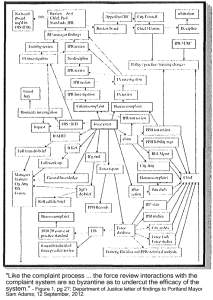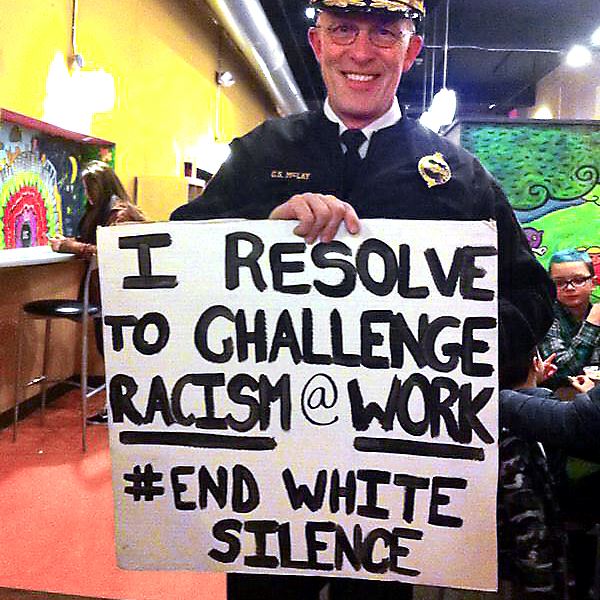We acknowledge police departments are taking innovative steps in building community trust. Chief Cam McLay thinks holding his men accountable to the community will help in the mission.
We must acknowledge police departments are taking innovative steps in building community trust. Some readers may be aware of recent events in Pittsburgh, Pennsylvania. In September, after two months of community meetings integral to a national search for a new Chief of Police, their City Council hired Cameron S. McLay, formerly a Madison, Wisconsin police captain. (Criteria here. Carnegie Mellon University’s Deliberative Democracy Initiative facilitated community dialogue.)
From our perspective in Portland, Oregon, this diligence is surprising. It arises from a community whose police force has not been found engaged in civil rights violations … as ours has.
Pittsburgh Mayor William Peduto and Public Safety Director Stephen Bucar valued McLay’s strategic and internal trust-building process. His prior work – later developed into training materials – “identified inconsistent and ineffective leadership methods within the department.” It “installed effective, ethical leadership practices.” The City’s press release depicted McLay as a “specialist in organizational leadership and community policing.”
His community introduction quoted a Wisconsin neighborhood association board member:
“Captain McLay demonstrated extraordinary leadership in Madison by bringing the community together and connecting all the stakeholders, from parents to community members, faith leadership and community organizations. His creative strength is his ability to build community. He doesn’t just focus on the punitive aspects of police work, but instead focuses on community building and quality of life in neighborhoods.”
On 23 December, McLay released this open letter to his new community. He posted it in an online group of law enforcement executives, in which Minority Partner Roger David Hardesty participates. The new Chief’s letter specifically addressed the deaths of Brown, Garner and Rice, and acknowledged a “trust gap between police and many of our communities of color.”
Our response to law enforcement:
We appreciate it when McLay offers specifics, on improving the integrity of accountability systems. He reports, “We are creating an Office of Professional Standards (OPS) that will work closely with the Office of Municipal Investigations (OMI), and are conducting thorough audits of all of our accountability systems.” He then commits to a thorough audit of police training.
We don’t know local power structures, but it seems his internal OPS may be aligning with investigative authority located outside the Bureau. If so, we assert this is positive. The People are likely to recognize such cooperative alignment as a ‘checks and balances’ feature … so distinctive in the American experience. An assessment – for effective accountability – would then be to discern whether the above OMI has sufficient independence, and authority, to get to “the meat of a matter.” Do they have the power to compel officer testimony? Transparency is another hallmark of representative governance: do OMI investigators have working knowledge of – and unfettered access to – Bureau records? Have they a history of reporting findings out to the public?
Review of police practices in Portland, Oregon reveals our Bureau does no general recruitment, and screens applicants for a pro-police bias before granting access to citizen review boards. When coupled with unwritten protocols inhibiting members’ public testimony, the perceived integrity of these boards is very low. These ‘review boards’ have no influence on policy. They have no ability to actually set community-based standards, by which police can be held accountable. They lack legitimacy in public perception.
We contend one feature that would indicate legitimacy is for an audit to reveal active, vital participation on these boards by disinterested representatives from local chapters of professional training, organizational management, and other professional organizations.
Another value in an audit may be to discern complexity in accountability systems. The US Department of Justice posted a flow chart (right) of use-of-force review cycles in 2012 Findings that Portland practices illegal use of force. Investigators used the graphic to depict what they termed a ‘self-defeating accountability system’ in general. Convoluted processes lead to fatigue on the part of complainants. Incomplete reporting cycles do not offer executives the benefit of responding to field conditions, as reported by these external sources. Excessive delays in reporting, and an inability on the part of the public to appreciate connections between complaint and distinctly perceived remedy, also impact perceived legitimacy. Portland’s tricameral review boards and committees are so complex they stymie effective public analysis by all but the most diligent.
McLay is not alone when he asserts, “We must assure those calling for change that we hear and understand them, and are committed to police accountability.” After a laudable commitment to ongoing conversations with the Corvallis Chapter of the NAACP; Corvallis, Oregon PD Chief Jon Sassaman recently opened the department’s annual diversity and inclusion sessions to trainers working with the racial justice advocates. The parties took a subsequent, unexpected step: they opened these training sessions to the general public.
We need more than cultural competency in policing, however. If these police/ public initiatives lead to greater public involvement – and influence – in police training, recruiting, discipline and policy setting, we submit that departments will be seen as legitimate … as having emerged from the consent of the governed.
Had the idea of audits been presented by, say, a corporate executive to his board, it might not have gotten the push-back it has among police advocates.
McLay stopped in a coffee shop on New Year’s Eve. Activists from ‘white identified’ What’s Up?! Pittsburgh, approached their chief and asked him pose with their sign. McLay obliged. He even re-tweeted their image. Thinking it a social good, Mayor Peduto re-posted the photograph to his own facebook account … and the meme went viral. Perhaps you’ve seen it. (See below.)
Fraternal Order of Police President Howard McQuillan (also on McLay’s search committee) led what has been a general condemnation by law enforcement advocacy groups. Using hyperbole we’re familiar with in Portland, McQuillan blasted out: “By Mayor Peduto labeling us ‘corrupt and mediocre’ and now our current Chief insinuating that we are now racist, merely by the color of our skin and the nature of our profession, I say enough is enough!” (Italics in the reporting.) McQuillan accused the Chief of being hypocritical with the department’s social media policy and filed formal complaint.
McLay issued an apology to his command. He closed his Twitter account, pending internal investigation. Among his last tweets: “@endwhitesilence: It’s time for courageous conversations about implicit bias, race and gender @ work & in our communities. It’ll be OK…”
These were not his last words on the matter, however. Click the image for more of his messaging. We think his noble efforts to build community trust, specifically around racism, will surprise you.
Our question for readers is, “To what degree would a police strike be a good indicator that community-based policing is about to be adopted?”
### 30 ###
UPDATE: Post received editorial treatment, contributed by Timonthy Flanagan, WritingRescource.info.



Existing civil rights protections are not absolute in McLay’s mind. For the right to wield body-worn cameras in peoples’ homes, he’s enlisted PBP Lt. Clarence Trapp and a Professor David Harris … to circumvent privacy protections. “He cannot yet equip the bulk of the department’s patrol officers because of yet another issue with the state’s wiretap laws,” says reporting.